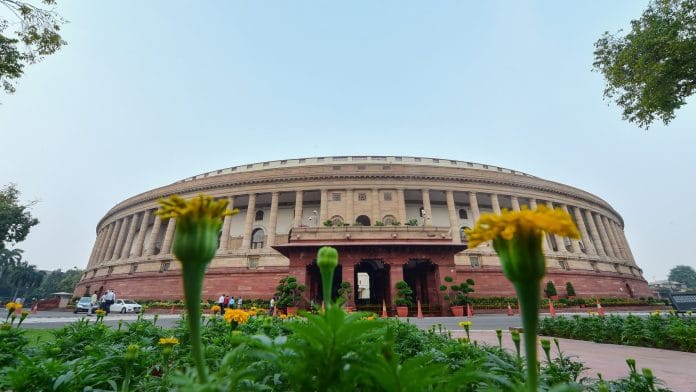New Delhi: Of the 50 Members of Parliament (MPs) who won in the 2019 general elections with the widest vote margins, 42 belonged to the Bharatiya Janata Party (BJP), with victories ranging from four-seven lakh votes.
Only three Congress MPs made it to the top 50, with a 30 per cent or higher vote margin — none of them from party-ruled Punjab, Rajasthan and Chhattisgarh. While Rahul Gandhi was among the three, winning from Wayanad in Kerala, the other two were from Tamil Nadu, where the party’s alliance with Dravida Munnetra Kazhagam (DMK) helped.
The DMK performed one better. It got four MPs in the top-50 list — all securing a margin of more than four lakh votes.
A victory of over five lakh votes — seen only four times in electoral history before 2019 — was had by 13 MPs, out of which only two were from the opposition (DMK). Of these, four even touched six-lakh plus wins. Moreover, 308 MPs won by over 1 lakh wins.
An interesting nugget about BJP’s massive win in 2019, amid the ‘Modi wave’, was that the MP with the narrowest win margin also belonged to the party — B.P. Saroj, who won by only 188 votes from Machhlishahr constituency in Uttar Pradesh.
These data points were brought to light last week when the Election Commission of India released the compiled data on the 17th Lok Sabha elections, two years after the polls.
BJP MPs on top
In the top-50 club, the highest margin was for C.R. Patil, a close confidant of Prime Minister Narendra Modi. He won from Navsari in Gujarat with over 6.89 lakh votes. His rival from Congress, Dharmeshbhai Bhimbhai got only 2.83 lakh votes against Patil’s 9.72 lakh.
Patil was later appointed the Gujarat BJP president.
The four MPs who won the 2019 elections with over six lakh votes were all from BJP — Patil, Sanjay Bhatia from Karnal (Haryana), Krishan Pal Gurjar, a minister of state now, from Faridabad (Haryana), and Subhash Chandra Baheria from Bhilwara in Rajasthan.
The highest number of MPs in the list isn’t from Gujarat, the PM’s home state, but Rajasthan, the stronghold of former chief minister Vasundhara Raje. Nine MPs from Rajasthan made it to the list. Congress didn’t win a single seat in Lok Sabha from the state while BJP won all 25.
Chief Minister Shivraj Singh Chouhan’s Madhya Pradesh delivered the second highest number of large margins, with six MPs featuring in the list. Out of the 28 seats in the state, BJP won 27, with only Congress leader Kamal Nath’s son Nakul Nath managing to secure victory from Chhindwara.
Gujarat has five MPs in the list.
Individual wins, again most from BJP
Among the most notable names in the widest victory margin club were PM Modi, who won from Varanasi with 4.79 lakh votes, Home Minister Amit Shah, who won from Gandhinagar with 5.57 lakh votes, and Rahul Gandhi, who won from Wayanad with 4.31 lakh votes.
Among the other BJP MPs who scored big were: Poonam Mahajan from Mumbai North with a margin of 4.67 lakh votes; Parvesh Sahib Singh Verma from West Delhi by 5.78 lakh votes; Hans Raj Hans from Northwest Delhi by 5.53 lakh votes; Dushyant Singh, son of Vasundhara Raje who won from Jhalawar by 4.53 lakh votes; Rajyavardhan Singh Rathore from Jaipur by 4.30 lakh votes; Jayant Sinha from Hazaribagh by 4.79 lakh votes; and Giriraj Singh from Begusarai with 4.22 lakh votes.
Also read: Liberal intellectuals lack popular political language against Hindutva. That’s just lazy
Only 8 MPs from opposition
Only eight opposition MPs were in the top-50 biggest win margin list, including four from the DMK — which also won the 2021 assembly elections in Tamil Nadu — three from Congress, and one from Shiv Sena (which fought in an alliance with BJP in 2019).
Congress’s Su. Thirunavukkarasar won from Tiruchirappalli with 4.59 lakh votes and Jothi Mani in Karur with 4.22 lakh votes.
DMK’s winners included T.R. Baalu, a former union minister who won from Sriperumbudur with 5.07 lakh votes, and P. Velusamy from Dindigul, who also won with over 5 lakh votes .
Shiv Sena’s Rajan Vichaare secured his win from Thane by over 4 lakh votes.
What analysts say: Modi wave was stronger
Sanjay Kumar, professor at Delhi-based think-tank Centre for the Study of Developing Societies (CSDS) said this trend shows two things.
“One is Congress’ marginalisation in north India, where they have governments but their governments didn’t inspire voters to vote for candidates in Rajasthan, Madhya Pradesh, and Chhattisgarh in the Lok Sabha election. The Congress actually didn’t add up to allies votes but it gained from alliance partner votes and this shows lack of enthusiasm in the voting pattern for the party in the last Lok Sabha,” he said.
“Secondly, BJP candidates are winning with huge victory margins not only in their stronghold states but across India. Such victory margins are only possible when there is a wave, and the data proved that the Modi wave became stronger in 2019,” he added.
The BJP’s average victory margin was 16 percentage points in 2014, which jumped to 20 percentage points in 2019.
The Congress had last seen a victory margin of 20 percentage points in 1980 when then PM Indira Gandhi had got a huge victory after the Janata Party debacle.
In the 2019 elections, 61.46 crore voters exercised their right to vote, with a voter turnout of 67.40 per cent, the highest in the history of general elections.
Also read: Raje, Raman, Raghubar — BJP’s ‘loser’ CMs remain party V-Ps only in name, have got no role






